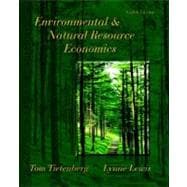
Note: Supplemental materials are not guaranteed with Rental or Used book purchases.
Purchase Benefits
What is included with this book?
| Visions of the Future | |
| Introduction | |
| Future Environmental Challenges | |
| Meeting the Challenges | |
| How Will Societies Respond? | |
| The Role of Economics | |
| The Road Ahead | |
| Valuing the Environment: Concepts | |
| Introduction | |
| The Human Environment Relationship | |
| Normative Criteria for Decision-Making | |
| Finding the Optimal Outcome | |
| Applying the Concepts | |
| Appendix: The Simple Mathematics of Dynamic Efficiency | |
| Valuing the Environment: Methods | |
| Introduction | |
| Why Value the Environment? | |
| Valuing Benefits | |
| Cost-Effectiveness | |
| Analysis Impact Analysis | |
| Property Rights, Externalities, and Environmental Problems | |
| Introduction | |
| Property Rights | |
| Externalities as a Source of Market Failure | |
| Improperly Designed | |
| Property Rights Systems | |
| Public Goods | |
| Imperfect Market Structures | |
| Divergence of Social and Private Discount Rates Government Failure | |
| The Pursuit of Efficiency | |
| An Efficient Role for Government | |
| Dynamic Efficiency and Sustainable Development | |
| Introduction | |
| A Two-Period Model Defining | |
| Intertemporal Fairness | |
| Are Efficient Allocations Fair? | |
| Applying the Sustainability Criterion | |
| Implications for Environmental Policy | |
| Appendix:The Mathematics of the Two-Period Model | |
| The Population Problem | |
| Introduction | |
| Historical Perspective Effects of Population Growth on Economic Development | |
| The Population/Environment Connection Effects of Economic Development on Population Growth | |
| The Economic Approach to Population Control Urbanization | |
| A Note on Using GIS to Map Population Data | |
| The Allocation of Depletable and Renewable Resources: An Overview | |
| Introduction | |
| A Resource Taxonomy Efficient Intertemporal | |
| Allocations Market | |
| Allocations | |
| Appendix:Extensions of the Basic Depletable Resource Model | |
| Energy: The Transition from Depletable to Renewable Resources | |
| Introduction | |
| Natural Gas | |
| Price Controls Oil | |
| The Cartel Problem Fossil Fuels | |
| National Security and Climate Considerations | |
| The Other Depletable Sources | |
| Unconventional Oil, Coal and Nuclear Electricity Energy | |
| Efficiency Transitioning to Renewables | |
| Recyclable Resources: Minerals, Paper, Bottles, and E-Waste | |
| Introduction | |
| An Efficient Allocation of Recyclable Resources | |
| Factors Mitigating Resource | |
| Scarcity Market Imperfections | |
| Replenishable but Depletable Resources: Water | |
| Introduction | |
| The Potential for Water Scarcity | |
| The Efficient Allocation of Scarce Water | |
| The Current Allocation System | |
| Potential Remedies GIS and Water Resources | |
| Land | |
| Introduction | |
| The Economics of Land Allocation | |
| Sources of Inefficient | |
| Use and Conversion | |
| Special Problems in Developing Countries | |
| Innovative Market-Based Policy Remedies | |
| Reproducible Private-Property Resources: Agriculture | |
| Introduction | |
| Global Scarcity | |
| Formulating the Global Scarcity Hypothesis | |
| Testing the Hypothesis | |
| The Role of Agricultural Policies | |
| A Summing Up Distribution of Food Resources Feast and Famine Cycles | |
| Storable, Renewable Resources: Forests | |
| Introduction | |
| Characterizing Forest Harvesting Decisions | |
| Sources of Inefficiency | |
| Poverty and Debt | |
| Sustainable Forestry Public Policy | |
| Appendix:The Harvesting Decision: Forests | |
| Common-Pool Resources: Fisheries and Other Commercially Valuable Species Introduction | |
| Efficient Allocations | |
| Appropriability and Market Solutions | |
| Public Policy Toward Fisheries | |
| Appendix:The Harvesting Decision: Fisheries | |
| Economics of Pollution Control: An Overview | |
| Introduction | |
| A Pollutant Taxonomy Defining the Efficient Allocation of Pol | |
| Table of Contents provided by Publisher. All Rights Reserved. |
The New copy of this book will include any supplemental materials advertised. Please check the title of the book to determine if it should include any access cards, study guides, lab manuals, CDs, etc.
The Used, Rental and eBook copies of this book are not guaranteed to include any supplemental materials. Typically, only the book itself is included. This is true even if the title states it includes any access cards, study guides, lab manuals, CDs, etc.